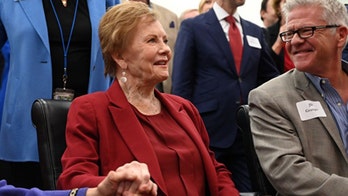Could Romney capitalize on same-sex marriage issue?
Conservatives say Obama's support will backfire at the polls
Prominent social conservatives are claiming that President Obama's endorsement of gay marriage could be the fuel Mitt Romney needs to unite the right in November.
Rick Santorum, the former Republican presidential candidate, is on record urging Romney to use this "potent weapon" against the president in the general election. And Family Research Council President Tony Perkins on Sunday called the president's announcement a "missing piece of intensity" for the presumptive GOP nominee.
Though gay marriage was not an issue that factored prominently into the 2012 election season until this past Wednesday, when Obama made his historic announcement, the clear distinction now between Obama and Romney has elevated the matter.
Obama has said he didn't make a political calculation when he decided to take the plunge and announce his support for the unions.
Now officials and activists on both sides of the aisle are suggesting that, while Obama has used the issue to raise millions of dollars for his campaign this past week, the announcement is not necessarily a political winner in the fall.
"I don't think the president did a political calculus to do this because if he did, he needs to go back to the calculator because it's a bad formula," Perkins told CBS' "Face the Nation."
Perkins called gay marriage a "serious issue" for Americans, and reportedly claimed Obama "helped fit that missing piece of intensity that Mitt Romney is going to need."
Speaking on CNN's "State of the Union," American Values President Gary Bauer claimed Obama had taken "six or seven states he carried in 2008 and put them in play" with his endorsement of same-sex marriage.
On the other side of the aisle, Democratic Sen. Dianne Feinstein told "Fox News Sunday" she thinks there was "no political calculus in this because it's not smart."
"If he's going to do it from a political point of view, it doesn't make any sense," she said.
Feinstein defended the president, though, saying his announcement was not a "flip-flop." She said Obama's "personal" evolution on gay marriage is one she went through as well.
Romney, for his part, has not made too many political predictions regarding Obama's gay marriage endorsement, but has reiterated in public his opposition to same-sex marriage since that Wednesday announcement.
He again made his position clear during a major address Saturday to the evangelical Liberty University.
Republican Party figures say the economy will remain the most important issue in the 2012 race despite the emergence of the gay marriage debate, but suggest that Obama's popularity will suffer -- noting that the number of states that have statutory or constitutional bans on gay marriage far outweighs the number that have legalized it.
Republican National Committee Chairman Reince Priebus said on NBC's "Meet the Press" that, for those voters who consider gay marriage the top issue, they now "have a clear choice" in November.
"I think the view that Gov. Romney holds on traditional marriage is the view that's held by a lot of people across this country," Sen. John Thune, R-S.D., considered to be a contender for the Romney running mate slot, told "Fox News Sunday." "There are more than 30 states who either by statute or constitutional amendment have defined marriage as being between a man and a woman."
Yet recent polling on the issue shows a mixed picture.
A USA Today/Gallup poll conducted May 10 showed a majority of Americans back Obama's endorsement. According to the poll of 1,013 adults, 51 percent approved of the decision while 45 percent disapproved. Sixty percent of those polled said the decision would make no difference in their vote.
Still, the poll showed 26 percent were less likely to vote for Obama because of it, while just 13 percent were more likely to back Obama.
Speaking on ABC's "This Week," the first openly gay member of Congress predicted Sunday that all the fanfare surrounding Obama's announcement would amount to not very much at the polls.
"If you were going to cast your vote based on a candidate's position regarding same-sex marriage, you were already going to vote for Obama-Romney based on that," Rep. Barney Frank, D-Mass., said. "I literally don't think anybody's vote was changed by this one way or the other."
Frank argued that the Obama administration already had pushed for the repeal of the "don't ask, don't tell" policy banning gays from serving openly in the military, and already had dropped its legal defense of the Defense of Marriage Act, which defines marriage as between one man and one woman.
"I can't think there are many people who said, OK, well, I'm going to vote for Obama even though he said that the Defense of Marriage Act is unconstitutional and he said gay people can serve in the military. But if he says marriage, that goes too far," said Frank, who plans to retire at the end of his current term.





